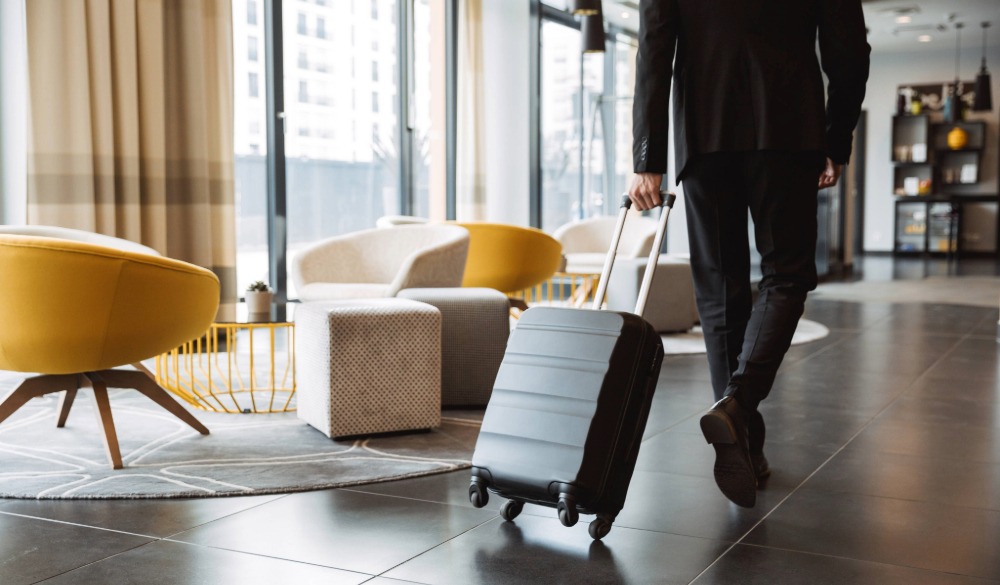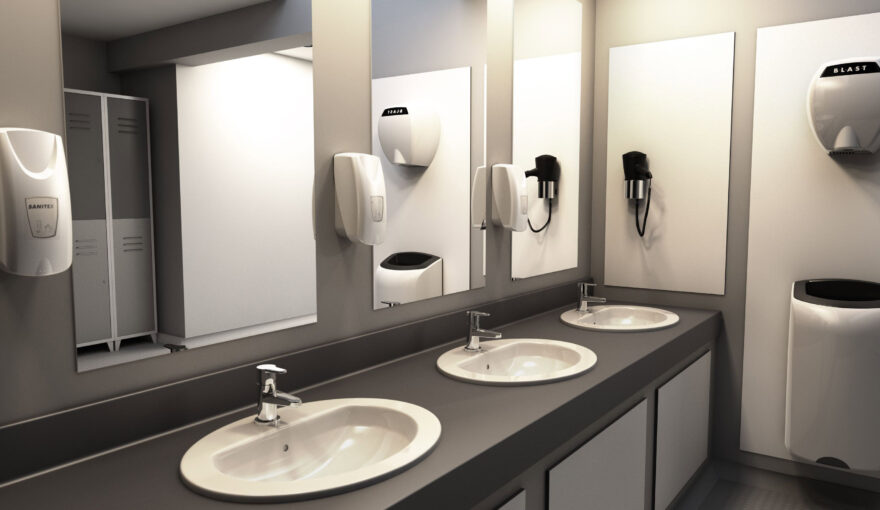In the world of hospitality, every detail matters. From the quality of the linens to the friendliness of the staff, each element contributes to a guest’s overall experience. One often overlooked yet powerful tool is scent marketing.

NWR Hygiene specialises in providing commercial hygiene solutions, including a range of air care products designed to enhance the ambience and create a lasting impression in hotels.
In this blog post, we will explore the fascinating practice of scent marketing for hotels, how it can be utilised to drastically improve the guest experience, and how NWR Hygiene can provide support with our high-quality air care solutions.
What is scent marketing?
Scent marketing is the strategic use of fragrance to evoke emotions, memories, and associations. It’s a subtle yet potent tool that can significantly impact consumer behaviour and brand perception. Unlike other marketing channels, scent marketing taps directly into our subconscious, bypassing rational thought and triggering emotional responses.
Our sense of smell is intricately connected to our limbic system, the part of the brain responsible for emotions, memories, and decision-making. When we encounter a familiar scent, it can instantly evoke powerful memories and emotions. This emotional connection can influence our attitudes, preferences, and purchasing decisions.
The power of scent marketing for hotels
Scent marketing for hotels can be a game-changer. By carefully selecting and strategically deploying fragrances, hotels can:
- Create a memorable first impression: A pleasant scent can create a positive and lasting impression on guests as soon as they enter the hotel.
- Enhance the guest experience: A relaxing and inviting atmosphere can contribute to a more enjoyable stay, encouraging guests to stay longer and return in the future.
- Improve brand recognition: Associating a specific fragrance with your hotel can make it more memorable and distinctive, helping to differentiate it from competitors.
- Boost customer satisfaction: A positive sensory experience can elevate the overall guest experience, leading to higher satisfaction ratings and increased loyalty.
- Create a sense of luxury: A high-quality fragrance can convey a sense of sophistication and exclusivity, enhancing the perception of the hotel’s brand.
By understanding the power of scent marketing for hotels, and implementing it effectively, they can create a truly memorable and engaging experience for their guests.
Different fragrances used by hotels
The choice of fragrance can significantly impact the mood and atmosphere of a hotel. Some popular scents used in hotels include:
- Floral fragrances are often used to create a calming and romantic ambience. These scents can evoke feelings of relaxation, tranquillity, and comfort, making them ideal for spa areas, guest rooms, and other areas where guests seek to unwind.
- Citrus fragrances can invigorate the senses and create a feeling of freshness. These scents are often used in public areas, such as lobbies and restaurants, to create a welcoming and uplifting atmosphere.
- Woody fragrances can evoke a sense of warmth, comfort, and grounding. These scents are often used in cosy and inviting spaces, such as lounges and libraries.
Green fragrances can create a clean and refreshing atmosphere. These scents are often used in spa areas, bathrooms, and other areas where cleanliness and freshness are important.
By carefully selecting fragrances that align with the desired atmosphere and brand identity, hotels can create a memorable and engaging experience for their guests.
The benefits of air care systems
To effectively implement scent marketing for hotels, they often rely on air care systems. These systems distribute fragrance throughout the property, ensuring consistent coverage and control. Here are some of the key benefits of using air care systems:
Efficiency
- Automated operation: NWR Hygiene’s air care systems can operate automatically, eliminating the need for manual intervention. This frees up staff time and ensures consistent fragrance delivery.
- Remote control: Many systems can be controlled remotely, allowing for adjustments to fragrance intensity and distribution from a central location.
Control
- Adjustable fragrance intensity: Air care systems allow you to control the strength of the fragrance being diffused, ensuring the right level of scent for each area of your hotel.
- Targeted fragrance delivery: Some systems can be configured to deliver fragrance to specific areas or rooms, providing greater flexibility and control.
Cost-effectiveness
- Long-lasting fragrance cartridges: NWR’s high-quality fragrance cartridges can provide long-lasting scent release, reducing the need for frequent replacements and saving on costs.
- Energy efficiency: Our air care systems are designed to be energy-efficient, minimising operating costs.
Improved air quality
- Odour elimination: Air care systems can help to eliminate unpleasant odours, such as cooking smells or bathroom odours, creating a more pleasant and inviting atmosphere.
- Enhanced air circulation: Some systems can improve air circulation, helping to reduce the spread of airborne contaminants and improve indoor air quality.
By investing in a reliable air care system, hotels can enjoy the benefits of scent marketing while also improving the overall air quality and comfort of their guest spaces.

The impact of air care on the guest experience
A well-chosen fragrance can significantly enhance the guest experience in a hotel. By carefully selecting and deploying scents, hotels can create a memorable and inviting atmosphere that fosters a positive emotional connection with guests.
Reducing stress and promoting relaxation
Certain fragrances, such as lavender and chamomile, have been shown to have a calming effect on the nervous system. By diffusing these scents in guest rooms and spa areas, hotels can help guests relax and unwind, reducing stress and promoting a sense of wellbeing.
Improving mood and creating a positive impression
Pleasant fragrances can have a significant impact on mood. Citrus scents, for example, can be invigorating and uplifting, while floral scents can create a sense of happiness and contentment. By using these fragrances in public areas, hotels can create a welcoming and inviting atmosphere that leaves a positive impression on guests.
Creating a sense of luxury
A high-quality fragrance can convey a sense of sophistication and exclusivity, enhancing the perception of a hotel’s brand. By using premium fragrances in guest rooms and communal areas, hotels can create a luxurious and indulgent experience for their guests.
Increasing brand loyalty
A memorable scent can foster a strong emotional connection with a hotel, making it more likely that guests will return in the future. By associating a specific fragrance with your brand, you can create a unique and memorable experience that sets your hotel apart from competitors.
Air care plays a vital role in enhancing the guest experience. By carefully selecting and deploying fragrances, hotels can create a welcoming, relaxing, and memorable atmosphere that fosters customer satisfaction and loyalty.
Different scents for different areas
To maximise the impact of scent marketing for hotels, it’s often beneficial to use different fragrances in different areas of the site. This can help to create a more tailored and engaging experience for guests, reinforcing the overall brand identity and atmosphere.
Lobby
The lobby is often the first area guests encounter, so it’s essential to craft a welcoming and inviting atmosphere. Citrus or floral fragrances can be particularly effective in this space, as they are often associated with freshness, happiness, and hospitality. These scents can help to create a positive first impression and set the tone for the guest’s stay.
Guest rooms
Guest rooms should be designed to promote relaxation and sleep. Lavender, sandalwood, or other calming fragrances can be used to create a serene and soothing ambience. These scents can help guests to unwind and relax after a long day, promoting a restful night’s sleep.
Spa
The spa is a place where guests go to relax and rejuvenate. Fragrances like eucalyptus, jasmine, or chamomile can create a serene and calming atmosphere that enhances the relaxation experience. These scents can also help to promote healing and well-being.
Restaurant
The restaurant is a place where guests come to enjoy food and drink. Stimulating and appetising fragrances, such as citrus or mint, can enhance the dining experience by stimulating the senses and creating a more enjoyable atmosphere. These scents can also help to mask any unpleasant odours that may arise during the cooking process.
By carefully selecting fragrances for each area of the hotel, you can create a more tailored and engaging experience for guests. This can help to reinforce the overall brand identity and atmosphere of your hotel, ultimately leading to increased customer satisfaction and loyalty.
How Can NWR Hygiene Help?
By investing in NWR Hygiene’s air care solutions, you can create a more welcoming, pleasant, and healthy environment for your customers and employees. Our range of scent diffusers and air fresheners not only improve air quality but also contribute to a positive brand image and enhanced customer satisfaction.
Contact us today to learn more about our products and services and to receive a personalised quote. Our team of experts is dedicated to providing tailored solutions that meet your specific needs and help you create a healthier, happier space.

